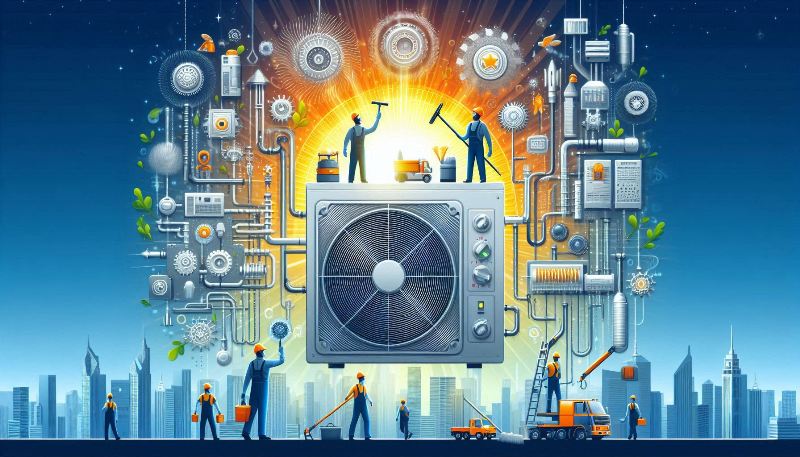What is Commercial HVAC Cleaning?
Commercial HVAC cleaning refers to the professional maintenance and cleaning of heating, ventilation, and air conditioning systems in business and industrial buildings. This process involves the thorough cleaning of air ducts, coils, fans, and other components of the HVAC system to ensure optimal performance, energy efficiency, and improved air quality.
Why is Commercial HVAC Cleaning Important?
Maintaining a clean HVAC system is essential for several reasons:
Energy Efficiency:
Dust and debris buildup in your HVAC system forces it to work harder to maintain the desired temperature. This leads to higher energy consumption and increased utility bills.
Indoor Air Quality:
A clean HVAC system helps in reducing the presence of allergens, dust, mold, and other contaminants that can affect indoor air quality, which is especially important for employee health and productivity.
Extended Equipment Lifespan:
Regular cleaning and maintenance reduce wear and tear on the system’s components, extending its operational life and saving on costly repairs or replacements.
Compliance with Health and Safety Regulations:
Many industries have regulations requiring the maintenance of clean air systems. Non-compliance can result in fines or shutdowns.
What Does the Commercial HVAC Cleaning Process Involve?
The commercial HVAC cleaning process generally involves the following steps:
Inspection:
A professional technician begins by inspecting the HVAC system to identify areas requiring cleaning or repair. This includes assessing air ducts, filters, coils, and fans.
Dust and Debris Removal:
Technicians use specialized equipment, such as high-powered vacuums and brushes, to remove dust, dirt, and debris from air ducts, vents, and coils. This step prevents the recirculation of contaminants in the air.
Sanitizing and Disinfecting:
HVAC cleaning services often include sanitization, where antimicrobial treatments are applied to prevent mold, bacteria, and mildew growth within the system.
Air Filter Replacement:
Replacing dirty filters with high-quality air filters ensures better filtration of air, improving indoor air quality and system performance.
Final Inspection and Testing:
Once the cleaning is complete, a final inspection is conducted to ensure the HVAC system is functioning efficiently. Technicians may also test airflow and energy efficiency levels to confirm improvements.
How Often Should Commercial HVAC Cleaning Be Done?
The frequency of commercial HVAC cleaning depends on several factors, including the size of the building, usage, and industry regulations. However, it’s recommended to have HVAC systems cleaned at least once every 12-24 months. Businesses operating in industries that produce higher levels of dust or pollutants, such as manufacturing plants or restaurants, may require more frequent cleaning.
Benefits of Regular Commercial HVAC Cleaning?
- Reduced Energy Costs: A well-maintained HVAC system operates more efficiently, leading to lower energy consumption and reduced utility bills. Clean systems don’t have to work as hard to regulate temperature.
- Healthier Indoor Environment: Clean air ducts and filters contribute to improved indoor air quality, which can reduce respiratory issues, allergies, and illnesses caused by poor air quality.
- Improved Comfort and Productivity: A clean and efficient HVAC system ensures consistent temperature control, making the indoor environment more comfortable for employees and customers, potentially boosting productivity.
- Compliance and Safety: Keeping your HVAC system clean helps meet OSHA and other safety standards, ensuring a safe and compliant workplace environment.
- Prevention of System Failures: Routine cleaning helps identify potential issues early, preventing unexpected breakdowns and costly emergency repairs.
Can Commercial HVAC Cleaning Improve Air Quality?
Yes, regular commercial HVAC cleaning significantly improves indoor air quality. By removing contaminants like dust, mold spores, and allergens, the system is better equipped to circulate clean air. This is especially crucial for environments where air quality is directly linked to employee health and customer satisfaction, such as healthcare facilities, offices, and schools.
Conclusion
Commercial HVAC cleaning is an essential service that enhances energy efficiency, extends the lifespan of the HVAC system, improves air quality, and ensures compliance with health and safety regulations. By maintaining a regular cleaning schedule, businesses can save on energy costs, prevent equipment failure, and create a healthier work environment for employees and customers alike.
Consider scheduling your next HVAC cleaning service to ensure your commercial building operates at peak efficiency!

